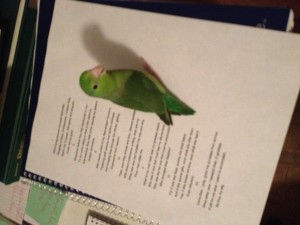Greetings!
I’m Breanna Simpson, a fourth year UBC Arts student, majoring in English Lit and Classical Studies. My focus is mainly on my Classical Studies degree, and I plan to pursue a Masters program in the subject after completing my fifth and final year in the coming winter session at UBC. My main area of interest is ancient languages and literature, primarily koine greek and greek verse.
I’m currently enrolled in several courses this summer, primarily languages, but EN 470A is my only distance course this term. It is also the first course I’ve ever taken which uses social media as a medium for learning. I’m finding this format both refreshing and surprisingly challenging, thus far. I’m taking the course both to satisfy my Canadian Lit requirement, and to help rectify my own ignorance about Indigenous issues. So far, both the readings and the other course content are proving more than up to the challenge, and I find that my awareness of some issues has already increased.
An online course designed to cultivate and stimulate a critical understanding of Canadian literary canon; what our stories are, where they come from, and how we perceive them, “Oh Canada! “Our Home and Native Land”” seeks to challenge our assumptions about what makes up”our”stories, as we think we know them. It does this by presenting a variety of primary and secondary sources which examine issues of storytelling, colonialism, and racism, from both Indigenous and European perspectives. The course offers a cutting edge approach to utilizing social media to facilitate student learning and participation, turning the sometimes alienating and anonymous world of the WWW into a chance to connect with other students and contribute opinions and content on an entirely different level to the traditional classroom environment. This course joins a growing wave of change in the way learning is presented and experienced, feeding off of the phenomenon of distance education which increased exponentially with the advent of the WWW(Bruce, 1999). Thus far, this course shows every sign of far exceeding Doyle’s(and my own) rather poor opinion of the potential of distance education to become a force of learning capable of rivaling more traditional, classroom based systems.
While in some ways I represent the epitome of a privileged young Canadian WASP, if there is such a thing, my family background, consisting of mostly dirt-poor Irish immigrants and coal miners, coupled with my own experiences growing up as a bullied loner from an extremely fragmented extended family, has led me to often question the labels and categories we freely assign to people based on our cultural and societal preconceptions of how different groups are supposed to behave. I have every hope that this course will enable me to answer some of my own questions about these labels, perhaps through a deconstruction and examination of the socio-political climates that created some of these labels in the first place.
In my personal life, I am a book crazed menagerie owner who adores anything with fur or feathers, works long hours in UBC libraries, and intends to volunteer at the local animal shelter this summer(RAPS-check it out, they’re a great organization with thousands of animals in need of good homes), since three rescue additions in three months has left my living space full to capacity with cages and food pellets. I have great hopes of making lots of new online buddies in this course, and hopefully increasing my understanding of what it means to be Canadian at the same time.
References:
Bruce, Bertram. “Education Online: Learning Anywhere, Any Time.” Journal of Adolescent and Adult Literacy. 42.8(1999): 662-665. Web. May 14, 2014.
Richmond Animal Protection Society. RAPS, 2007. Web. May 16, 2014.
